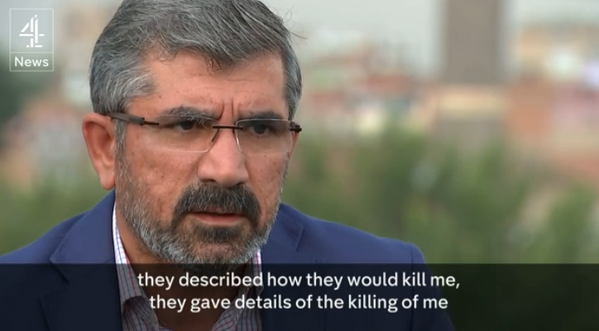We Are All Tahir Elçi
His voice was one of reconciliation and promotion of a peaceful solution to the decades long struggle between the Turkish state and the armed Kurdish resistance movement, the Kurdistan Workers’ Party (PKK).
But on Saturday the voice of Mr. Tahir Elçi was silenced when he was killed with a single shot to his head after giving a speech in Amed (Diyarbakir) in northern Kurdistan (southeast Turkey). He was calling for an end to the violence between the Turkish state and the PKK: “We do not want guns and clashes.”
It is not clear who the perpetrator is and an investigation into the murder has been launched. But if the killings and massacres of other Kurdish lawyers, politicians, journalists, intellectuals and civilians are any indication, the death of Mr. Tahir Elçi will also remain unresolved and intensify the evergrowing distrust and hostility towards the Turkish state.
Mr. Tahir Elçi was a prominent Kurdish lawyer and the president of the Diyarbakir Bar Association. He was an outspoken defendant of human rights in Turkey and brought several cases regarding forceful disappearances and killings of Kurds perpetrated by the Turkish state to the European Court of Human Rights. Before his death he was leading fact-finding missions in Kurdish districts under state-imposed curfews that according to Kurdish officials and journalists have led to the deaths of civilians and put other lives at risk.
According to Human Rights Watch, Mr. Elçi had throughout the years also been subjected to torture and arbitrary arrests, a practice that was more the rule than the exception for anyone involved with Kurdish rights in 1990s Turkey.
Emma Sinclair-Webb, senior researcher at Human Rights Watch, said of Mr. Elçi: “Tahir Elçi played a key role in representing victims of human rights violations and was critical of abusive tactics whether by the state or by armed groups.”
In October, Mr. Elçi appeared on a TV show where he said that the PKK was not a terror organization.
”The PKK is a political movement which has important political demands and which enjoys widespread support, even if some of its actions can be characterized as terrorist acts.”
Because Mr. Elçi failed to adhere to state propaganda and expressively classify the PKK as a terror organization and instead chose to describe a complex matter with the nuance that it deserves, the Istanbul prosecutor shortly after the TV segment ended ordered the arrest of Mr. Elçi on charges of “terror propaganda.”
While waiting in his office to be detained by Turkish police, Mr. Elçi was surrounded by his colleagues and Mr. Muharrem Erbey, a Kurdish lawyer who has also fallen victim to the Turkish state’s vague terror law, tweeted: “We are waiting!”
Mr. Elçi’s case led to massive expression of support but also brought about several death threats, especially on social media as he explained to Channel 4 in one of his last interviews.
Not long after he was killed in what the pro-Kurdish Peoples’ Democrati Party calls a “planned assassination.” Two police men were killed and 11 people injured.
Turkey’s Prime Minister Ahmet Davutoğlu said that if Mr. Elçi had been assassinated, then it was an attack on all of Turkey: “The target is Turkey. It’s an attack on peace and harmony in Turkey.”
But Mr. Elçi was a human rights defender and therefore almost per definition a target of the Turkish state. His life was not made easy by the Turkish state and it is an insult to his memory and what he fought for when Turkey’s Prime Minister makes his death a symbolic attack on the state. In reality, it was Mr. Elçi’s life and work that were an attack on the oppressive and brutal governments that have reigned in Turkey.
When the Istanbul court released Mr. Elçi in October, they banned him from leaving the country. At his funeral yesterday, his wife said: “He would say ‘My travel ban has been lifted. I am now free to go wherever I want to.’ ”

Comments are closed.